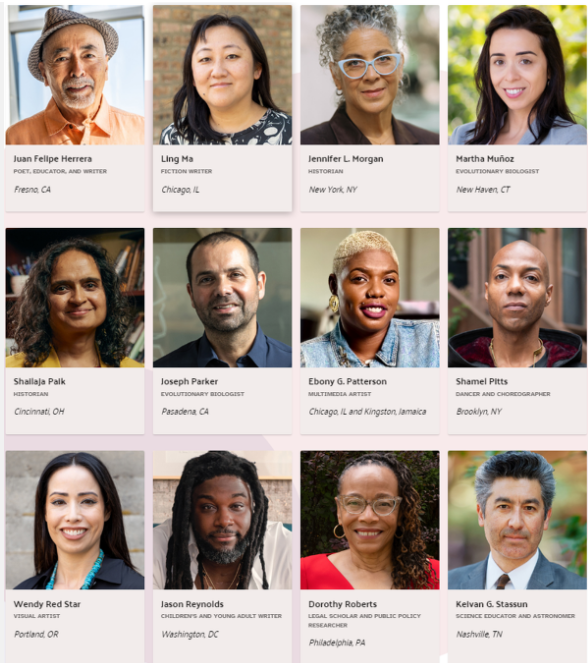Dalit Studies Expert Receives 2024 MacArthur ‘Genius Grant’ Award

The John D. and Catherine T. MacArthur Foundation revealed its 2024 class of fellows on Tuesday, commonly referred to as recipients of the “genius grant.” Among the honorees is 50-year-old Shailaja Paik, a scholar of modern Indian history at the University of Cincinnati, originally from India. Her research delves into caste-based discrimination and its complex relationship with gender and sexuality, particularly in the lives of Dalit women.
The 22 fellows will each be awarded $800,000 over the next five years, with complete freedom on how to use the funds. They were chosen through a year-long selection process, which involves input from their peers and communities. Nominees do not apply, nor are they notified of their nomination unless selected for the award.
The interdisciplinary grant aims to “empower” individuals who have a history of exceptional achievements and the potential to create even more remarkable contributions, according to Marlies Carruth, director of the MacArthur Fellows Program.
Also Read: How to Apply Airtel Payments Bank Saving Account and it’s Benefits.
The John D. and Catherine T. MacArthur Foundation announced its 2024 class of fellows on Tuesday, commonly known as the recipients of the “genius grant.” Among the recipients is Shailaja Paik, a 50-year-old Indian-origin historian at the University of Cincinnati. Her research focuses on caste discrimination and its connections with gender and sexuality in the lives of Dalit women in modern India.
This year’s group of 22 fellows will each receive a grant of $800,000 over five years, with complete flexibility in how they choose to use the funds. The fellows are selected through a year-long nomination process that involves feedback from their communities and peers. There is no application process, and nominees are not informed unless they are selected for the award.
The interdisciplinary award is designed to “empower” individuals with a proven record of accomplishment and the potential to produce further extraordinary work, explained Marlies Carruth, the director of the MacArthur Fellows Program.
2024 Fellows:
- Loka Ashwood, 39, Lexington, Kentucky: A sociologist at the University of Kentucky studying how environmental issues, corporate interests, and state policies negatively impact rural communities and erode their faith in democracy.
- Ruha Benjamin, 46, Princeton, New Jersey: A transdisciplinary scholar at Princeton University whose work examines how technological advancements and medical research often reinforce societal and racial inequalities.
- Justin Vivian Bond, 61, New York: A renowned cabaret artist and performer who has been a champion for civil rights, offering solace to the LGBTQ+ community while inspiring transgender artists.
- Jericho Brown, 48, Atlanta: A poet at Emory University whose lyrical work delves into contemporary culture, blending vulnerability and form experimentation.
- Tony Cokes, 68, Providence, Rhode Island: A media artist at Brown University, known for creating video works using text and cultural fragments to critique social issues, including police violence.
- Nicola Dell, 42, New York: A computer scientist at Cornell Tech, she studies the role of technology in intimate partner abuse and develops tools to assist survivors.
- Johnny Gandelsman, 46, New Paltz, New York: A violinist and producer who reinterprets classical music with unique styles while promoting contemporary composers.
- Sterlin Harjo, 44, Tulsa, Oklahoma: A filmmaker who co-created the TV series Reservation Dogs, which highlights the everyday experiences of Native American communities.
- Juan Felipe Herrera, 75, Fresno, California: A poet and educator whose bilingual works express the shared experiences of Mexican-American communities, drawing on contemporary events and pre-colonial cultures.
- Ling Ma, 41, Chicago: A fiction writer whose speculative and surreal stories illuminate themes of alienation, immigration, and materialism in modern life.
- Jennifer L. Morgan, 58, New York: A historian at New York University whose research sheds light on the exploitation of enslaved African women and their role in building the wealth of slaveowners and the economy.
- Martha Muñoz, 39, New Haven, Connecticut: An evolutionary biologist at Yale University studying the factors driving patterns and rates of evolution.
- Joseph Parker, 44, Pasadena, California: An evolutionary biologist at Caltech whose research focuses on rove beetles and their symbiotic relationships with other species.
- Ebony G. Patterson, 43, Kingston, Jamaica, and Chicago: A multimedia artist whose intricate works explore social histories by juxtaposing vibrant landscapes with elements of mourning.
- Shamel Pitts, 39, Brooklyn, New York: A dancer and choreographer who leads the artist collective TRIBE, creating collaborative works that envision futures free from oppression, especially for the African diaspora.
- Wendy Red Star, 43, Portland, Oregon: A visual artist who uses archival material to challenge colonial narratives and bring Native American perspectives to the forefront.
- Jason Reynolds, 40, Washington, D.C.: A children’s and young adult author whose genre-defying works reflect the experiences of Black youth and encourage them to tell their own stories.
- Dorothy Roberts, 68, Philadelphia: A legal scholar at the University of Pennsylvania whose work focuses on racial inequities in child welfare and healthcare, particularly the denial of autonomy to Black women.
- Keivan G. Stassun, 52, Nashville, Tennessee: An astronomer at Vanderbilt University who advocates for diversity in science education while researching star evolution.
- Benjamin Van Mooy, 52, Woods Hole, Massachusetts: An oceanographer at the Woods Hole Oceanographic Institution who studies plankton and their vital role in sustaining marine ecosystems.
- Alice Wong, 50, San Francisco: A writer and disability rights advocate who founded the Disability Visibility Project and campaigns for the rights and visibility of disabled individuals.
These extraordinary individuals are recognized for their exceptional contributions to their fields, with the MacArthur Fellowship aiming to support and amplify their future endeavors.
Next Story:



One thought on “Dalit Studies Expert Receives 2024 MacArthur ‘Genius Grant’ Award”